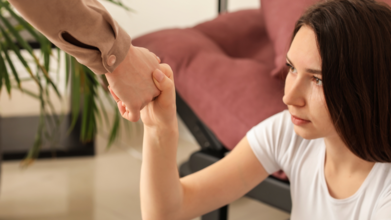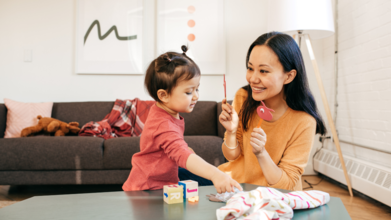- Health Conditions A-Z
- Health & Wellness
- Nutrition
- Fitness
- Health News
- Ayurveda
- Videos
- Medicine A-Z
- Parenting
- Web Stories
Teen Mental Health Is Getting Better - Federal Report Shows 20% Decrease In Depressive Episodes And More

(Credit-Canva)
Teen mental health has been a major conversation, especially when it comes to children and healthy development. Many of us can relate to feeling unheard, helpless and undiagnosed depressive episodes. Reports had shown a severe lack of support and proper care for teen mental health. As more and more people became aware of mental health and well-being, the lack of care and resources just for teens was also highlighted. These reports have helped build a solid foundation for children, giving them the support they require.
However, there is some better and hopeful news for teens. A new federal report suggests that fewer teenagers are experiencing major depressive episodes and suicidal thoughts.
Have Mental Health Issues Declined In Teens?
A recent report from the Substance Abuse and Mental Health Services Administration found that between 2021 and 2024, there was a more than 20% decrease in teenagers (ages 12 to 17) who reported having a major depressive episode or serious suicidal thoughts, plans, and attempts. This is a positive sign after years of increasing rates.
Mental health experts are encouraged by these findings, but they caution that it's still too early to draw a full conclusion without more data. However, the report provides a first look at how youth mental health has changed since the start of the COVID-19 pandemic.
How and Why Things Are Improving
Experts believe that the isolation of the COVID-19 pandemic helped "open the eyes" of many adults, leading to a greater focus on youth mental health. As a result, more parents, teachers, and policymakers are more aware of mental health needs. This shift has led to an increase in programs designed to help young people, including those in schools and through telehealth services.
These programs often focus on prevention and early intervention. This means giving kids the tools to cope with difficult emotions and situations before they become a crisis. By doing this, adults are helping to normalize conversations about mental health, making it less of a taboo subject.
Challenges That Still Remain
Despite the positive trends, the report highlights that there is still a lot of work to be done.
High Rates of Depression
Over one-fifth of all teenagers still experienced at least one major depressive episode last year.
Low Treatment Rates
Only about 60% of these teens received mental health treatment. Many reported that they didn't seek help because they were afraid of what others might think, worried about privacy, or didn't believe treatment would work.
Adults Are Struggling, Too
The report found no notable improvement in mental health among adults. This is a concern, as adults who are struggling may not be able to model healthy coping skills for the children in their lives.
Vulnerable Communities
Certain groups, including children of color and those in the LGBTQ+ community, continue to face a higher risk of depression and suicide.
Experts emphasize the importance of communication between caregivers and children. Talking about mental health should be as normal as talking about other safety issues. They encourage parents to speak with their child's doctor or school counselor to learn about available resources.
Children Are Equally Affected By Both Verbal And Physical Aggression – Does Discipline Need Harsh Punishments And Scoldings?

(Credit-Canva)
The age-old belief that verbal punishments make kids soft and that they will not understand authority without physical punishments is not true. Even though your harsh words may not leave physical bruises on your child, the verbal whiplash from it is enough to affect your child for a lifetime.
According to a new study published in the journal BMJ Open. The research found that verbal abuse in childhood can harm a person's mental health in adulthood just as much as physical abuse.
Are Kids Affected By Verbal Abuse?
The study showed that verbal abuse increased a child's likelihood of having low mental well-being as an adult by 64%, while physical abuse increased the odds by 52%. For those who experienced both types of abuse, the risk of low mental well-being was doubled.
Researchers noted that while the harm of physical abuse is often immediately obvious, the damage from verbal abuse can be just as serious and long-lasting, even if it's not as easy to spot.
While physical abuse has become less common, verbal abuse is on the rise. The study, which tracked over 20,600 children in England and Wales, found that physical abuse cases dropped from 20% in children born between 1950 and 1979 to 10% in those born after 2000. However, verbal abuse increased from 12% to almost 20% during the same time.
The study found that verbal abuse was just as damaging to a person's mental health as physical abuse. About 24% of adults who were verbally abused as children had low mental well-being, compared to 23% of those who were physically abused. This number jumped to 29% for those who suffered both. In comparison, only 16% of adults who were not abused had low mental well-being.
How Do Harsh Words From Parents Impact Children?
Adults with low mental well-being struggled with feeling optimistic, useful, or close to others. They also had a harder time dealing with problems and thinking clearly. In most cases, verbal abuse had a greater impact on these specific aspects of mental health than physical abuse did.
For instance, verbal abuse increased an adult's odds of not feeling close to others by 90%, while physical abuse increased the odds by 33%. These findings highlight that even when a person has been physically abused, adding verbal abuse can bring an additional and significant risk to their mental health.
How You Reprimand Your Child Also Matters
A 2021 study from the University of Michigan looked at how different types of discipline affect children around the world. The study found that while spanking is always harmful, even some non-physical types of punishment can have mixed results.
The research suggests that the best way to raise well-behaved children may not be through punishment at all. Researchers believed that the most positive effects come from long-term investments in a child's life, such as:
- Spending quality time with them
- Showing them that they are loved
- Listening to them and their feelings
The study also found that when parents took away privileges, children were more likely to be aggressive and have trouble getting along with other children. They recommends that parents use discipline that is appropriate for the child's age, keep communication open, and provide a stable routine.
Toddler Parents Are More Prone To Orthopedic Injuries, Here's How To Be Safe

Credits: Canva
Before stepping into parenthood, people often hear the familiar warnings: sleepless nights, endless responsibilities, and constant busyness. What few mention is another reality, it is the risk of injury.
Many parents have stories of physical strain, from tweaking a back while lifting a toddler to rushing across the room at night and tripping, or developing wrist pain from scrubbing bottles and pump parts. These injuries can start small but often persist for years, especially when parents overlook their own recovery while prioritizing their children’s needs.
Why New Parents Are Vulnerable
New mothers are particularly at risk due to the physical toll of pregnancy and the extra caregiving responsibilities, including breastfeeding. Coupled with lack of rest, these factors create the perfect storm for long-term issues. Experts stress that parents should seek early treatment for injuries and, ideally, prepare their bodies for parenthood with core-strengthening exercises before the baby arrives. Some compare parenting to a sport, one that demands training.
The lack of public awareness may be partly due to the absence of data. While medical billing codes exist for unusual injuries such as being struck by an animal, there is no formal category for being injured while caring for a child. As a result, the scale of the issue is difficult to measure.
From Workout to Wear and Tear
On paper, parenting could be considered a gradual fitness programme. A newborn’s weight increases steadily over the years, and play evolves from pushing a stroller to chasing a running child. But in reality, children often treat their parents as climbing frames, yanking arms or jumping on backs, leading to muscle strains and joint issues.
Physical therapists note that back, neck, shoulder, and wrist injuries are among the most common for parents. The rise in average age for first-time parents also plays a role. Older parents may face more aches and slower recovery times, similar to how an older athlete’s body responds differently to strain.
Conditions like diastasis recti, where abdominal muscles separate during pregnancy, can lead to lasting issues, including back pain, difficulty lifting, and even incontinence. Without targeted recovery, such conditions can limit a parent’s ability to care for both their child and themselves.
Changing Lifestyles, Increased Risk
Today’s parents spend significantly more time with their children compared with previous generations, reports The Washington Post. This, combined with demanding jobs, reduced community support, and a tendency to multitask while exhausted, increases the likelihood of accidents and injuries.
Stories from parents range from predictable strains to bizarre mishaps. One parent recalled dislocating a toe during a playful indoor game, which led to surgery, complications, and months of recovery. These accidents highlight how even harmless activities can result in long-term physical challenges.
Prevention and Recovery Tips
While injuries may be part of the parenting journey, there are ways to minimize the risk:
Strengthen your core: Engage in exercises like yoga, Pilates, swimming, or weight training to support the back, shoulders, and neck.
Maintain proper form: Learn safe lifting techniques for picking up children, car seats, and other heavy items.
Avoid unnecessary bending: Sit when strapping a child into a stroller instead of bending from the waist.
Travel light: Carry only essentials to reduce strain.
Slow down: Rushing often leads to missteps. Make multiple trips if needed.
Clear walkways: Removing toys and clutter reduces the chance of tripping, especially during night-time emergencies.
Adapt workouts: Short, frequent exercise sessions can replace long gym visits.
Stay active: Regular movement now will make it easier to keep up with children later.
Seek help early: Ignoring pain often worsens the injury, making recovery longer and more difficult.
Harsh Parenting Linked to 64% Higher Risk of Poor Adult Mental Health, Study Finds

There’s a reason your inner critic sounds suspiciously like your mum or dad. A new study, published in BMJ Open, has found that parents who ridicule, threaten, or humiliate their kids may be doing long-term damage not just bruising their egos but their entire mental wellbeing. According to the research, such harsh parenting increases the odds of poor adult mental health by a staggering 64 per cent. That throwaway “You’ll never amount to anything!” may echo louder in someone’s head than an actual slap.
Sticks, Stones… and Sharp Words
Led by Professor Mark Bellis of Liverpool John Moores University, the study analysed data from 20,687 adults gathered through seven different studies published between 2012 and 2024. It used the Adverse Childhood Experiences (ACE) tool to track childhood abuse and the Warwick-Edinburgh Mental Wellbeing Scale to measure how well-adjusted the now-grown children turned out to be.The participants were asked to assess their mental wellbeing over a two-week period. Scores placed them in either the high or low mental wellbeing category.
The results were eye-opening. “Our study reveals that degrading, humiliating and abusive language directed at children can have long-term mental health impacts at least as severe as those associated with physical abuse,” said Prof Bellis.
A Slap vs a Sharp Tongue
While physical abuse raised the likelihood of poor adult mental health by 52 per cent, verbal abuse outdid it at 64 per cent. The prevalence of low mental wellbeing for those who had experienced no abuse stood at 16 per cent, rising to 22.5 per cent for physical abuse, 24 per cent for verbal abuse, and 29% for both physical and verbal abuse.The numbers speak for themselves. What’s even more troubling is that while physical abuse among participants fell over time, verbal abuse has been on the rise. Those born before 1950 reported a 12 per cent prevalence of verbal abuse. That number jumped to 20 per cent among those born in or after 2000.
“Equally concerning is the trend observed over the study period where physical abuse declined but verbal abuse increased … potentially offsetting the mental health gains we might expect from reduced exposure to physical harm,” Bellis said.
In other words, just because fewer kids are getting slapped doesn’t mean they’re better off. Words, especially when used as weapons, can leave wounds that take far longer to heal.
Why It Matters Now More Than Ever
The study also found a general dip in mental wellbeing among younger generations. Those born in or after 2000 reported higher rates of poor mental health overall. So even with greater awareness about mental health, something’s going very wrong.
The researchers didn’t dig into the exact reasons for these changing abuse trends or the individual severity of abuse cases, but they made one thing clear: “Although this study does not examine the reasons for these trends, it is vital that we do not simply replace one form of childhood trauma with another,” said Bellis.
What Parents Need Besides Just ‘Don’t Do That’
Telling parents not to hit or yell at their kids isn’t enough. According to the study authors, what’s needed is practical, accessible guidance on how to build nurturing relationships. Because no parent wakes up thinking, “How can I mess my kid up today?” But when there is stress, generational trauma, or lack of support, well-meaning discipline can veer into damaging territory.
“That’s why we must go beyond telling parents what not to do and instead offer clear, practical support and guidance that allows them to raise their children through healthy, nurturing relationships,” Bellis said.
Mental health doesn’t just show up one day in adulthood. It’s shaped, layered, and often haunted by childhood experiences, especially the unkind words and undermining comments that seem small at the time but settle deep into the psyche. So if you're still dealing with anxiety or low self-worth in your thirties, it might not be ‘just you’. It could be the voice of harsh parenting, still living rent-free in your head.
© 2024 Bennett, Coleman & Company Limited

